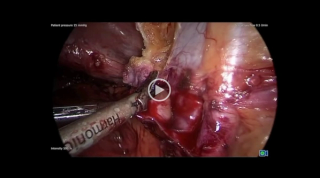
Surgery
Latest News

Latest Videos

CME Content
More News

Jean Dubuisson, MD, PhD, head of the gynecological surgery unit at Geneva University Hospitals, discusses the first successful hysterectomy performed using the MIRA surgical system.

In a recent study, increased rates of spinal hypotension were observed among women receiving a higher plain ropivacaine dose during cesarean section.

A meta analysis highlights how kinesiotherapy post-breast cancer surgery may significantly improve patient quality of life.

In a recent study, similar postoperative outcomes were reported in patients receiving anterior vaginal wall repair vs paravaginal repair for laparoscopic pelvic organ prolapse, including similar success rates.

In a recent study, researchers recommended minimally invasive procedures vs hysterectomy for improved patient outcomes when treating uterine fibroids.

New data from SMSNA 2024 show transplant recipients face a 17% reduced risk of poor sexual function outcomes after procedure.

In a recent study, patients undergoing music therapy reported better pain and stress scores, as well as improved pulse rates.

A recent study highlights that patients with endometriosis undergoing laparoscopic surgery use more opioids postoperatively, suggesting the need for tailored pain management.

In a recent study, a decrease in opioid dispensing was observed among youths undergoing surgical procedures, but rates remained high enough to warrant additional action.

In a recent study, sexual functioning outcomes were significantly improved in patients receiving hysterectomy, regardless of cervix preservation status.

In a recent study, patients with shunt complications rarely had poor obstetric outcomes, and no cases of shunt malfunction were reported.

A recent study shows that adding metronidazole to cefazolin significantly lowers the risk of surgical site infections in gynecologic cancer surgeries, enhancing patient outcomes.

A retrospective analysis of postpartum hemorrhage cases shows the noninvasive procedure may be a simplistic and highly effective mean to reduce bleeding.

A case series study shows women with absolute uterine-factor infertility who achieve a successful graft survival from uterus transplants may have greater conception success.

Virtual Incision Corporation has announced the successful performance of the first benign hysterectomy using their miniaturized robotic-assisted surgery device, MIRA, in a clinical trial assessing its safety and efficacy.

A recent study introduced a stratification tool to identify patients at higher risk for blood transfusion after laparoscopic myomectomy, highlighting key preoperative and intraoperative risk factors.

A recent study reveals that fertility-sparing surgery offers similar survival outcomes to standard surgery for cervical cancer patients with tumors of 4 cm or smaller, potentially expanding treatment options for younger women.

Review some of the top stories from the Contemporary OB/GYN website over the last week, and catch up on anything you may have missed.

A recent study finds that lateral episiotomy is a safe and effective procedure for reducing obstetric anal sphincter injuries in nulliparous women, highlighting its potential benefits during instrumental births.

A recent highlights elevated morbidity and mortality risks in premenopausal women underusing estrogen therapy after oophorectomy, underscoring the critical need for hormone therapy to mitigate adverse health outcomes.

Explore how robotic surgery revolutionizes obstetric and gynecologic procedures, offering enhanced precision, reduced complications, and improved patient outcomes, while also examining challenges and future prospects in the field.

A study highlighted how non-English-speaking patients undergoing gynecologic surgery face undertreated pain, emphasizing the need for equitable pain management practices.

Marci Bowers, MD, shares the biggest takeaways from her presentation on transgender reproductive care, presented at the 2023 Society of OB/GYN Hospitalists Annual Clinical Meeting in Chicago, Illinois.

In a poster featured at the 2023 Society for OB/GYN Hospitalists Annual Clinical Meeting, study investigators underline the importance of aesthetics in cesarean section closures as both providers and patients.

To close out Endometriosis Awareness Month in March, Rachel Cullifer, MD, discusses clinical pearls for diagnosis and treatment, as well as some common misconceptions about endometriosis.















